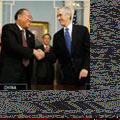Secretary of State Hillary Rodham Clinton called the recent two-day U.S.-China Strategic and Economic Dialogue “unprecedented.” The secretary said the talks have further convinced her that the more open the relationship between the United States and China, the better the interests of both countries and the world will be served.
Speaking in Washington July 28, Clinton said the candid discussions demonstrated that China and the United States are nations of pragmatic people who set goals and work to achieve them. Although the two countries have different histories, experiences, perspectives and challenges, the bilateral dialogue “holds great promise,” according to Clinton. The discussions addressed a range of issues, from cooperation on economic recovery to climate change and human rights.
Treasury Secretary Timothy Geithner, who also participated in the talks, said the two countries agreed on a broad framework for economic policies and reform. The United States will advocate for increases in private savings as part of an effort to lower its fiscal deficit. At the same time, China and other countries whose economies have largely been based on exports and overseas demand will need to “shift the source of growth more to domestic demand,” he said.
With this framework, both countries hope to build the foundation for “a more sustainable, more balanced global recovery,” according to Geithner. Geithner noted China's remarkable record of laying out reform plans and actually delivering on those commitments. During the talks, Chinese officials laid out a set of reforms to shift the sources of future growth away from carbon and export–intensive industries toward a services and consumer-based economy.
In closing remarks, officials from both countries said they had signed a memorandum of understanding to enhance bilateral cooperation on climate change, energy and the environment. Clinton said the memorandum between the world's two largest energy producers and consumers affirmed their joint commitment to reaching a successful international agreement on climate change and building a low-carbon economy. Chinese State Councilor Dai Bingguo said the dialogue is not only a continuation of previous exchanges between U.S. and Chinese leaders, but also a creation. Dai also called the discussions “unprecedented,” noting the wide range of topics and huge number of government departments and ministries involved.
America.gov recently spoke with Vasu Mohan, deputy director for the Europe and Asia program of the International Foundation for Electoral Systems, a nongovernmental organization that runs democracy projects in 30 countries. On August 20th, Afghanistan will hold elections, and women are serving important roles as candidates and voters.
Mohan said women are an indispensable component to democracy in Afghanistan. An election is not just an event, but the seed of long-term democratic behavior. When women are politically involved, they reinforce this behavior because of their influence within the family and in larger society, Mohan said. Women's participation in the August elections is a critical part of the overall political development of Afghanistan. As of March, Afghanistan's Independent Election Commission reported more than 4.4 million new voters have registered for the August 20 elections, which include votes for presidential and provincial council posts. Thirty-eight percent of voters are women.
There is a proverb in Afghanistan that highlights the slow but steady influence of women. It says that “drop by drop a river is made.” Under the Taliban, women were forbidden most educational opportunities and political participation. Now, almost eight years after the fall of the Taliban regime, more women than ever are voting and running for public office with the help of international and local NGOs and the Afghan government.
For example, since coming to power in 2002, the Afghan government has stepped up efforts to integrate women into the political life of the nation by setting aside 25 percent of seats for women in the provincial councils. Such quotas are necessary, according to Mohan, because men in Afghanistan have an unfair advantage through electoral knowledge, access to money for political campaigns, and even mobility. In many parts of the country women need to be escorted by male members of their families when they leave home.
The foundation uses many tools to help level the political playing field for Afghan women. These include the Consortium for Electoral and Political Process Strengthening, a program funded by the U.S. Agency for International Development. The program helps educate Afghan women about the responsibilities of democracy, such as the important role of voting. Knowledge of the issues and candidates, awareness of rights, and the administering and monitoring of elections are all important themes in workshops conducted by the foundation with Afghan partners.
After visiting Afghanistan earlier this year, U.S. Ambassador for Global Women's Issues Melanne Verveer observed that more women were running for political office. She noted that progress in Afghanistan must be measured not just in military terms, but also in terms of social, political and economic participation of women in rebuilding Afghanistan and in the safeguarding of their human rights.

